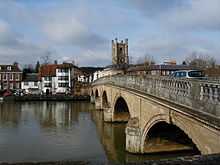Henley Bridge
| Henley Bridge | |
|---|---|
 The upstream side of the bridge at Henley-on-Thames from near the Henley Royal Regatta headquarters on the Berkshire bank | |
| Carries | A4130 road |
| Crosses | River Thames |
| Locale | Henley-on-Thames |
| Design | Arch |
| Material | Stone |
| Height | 14 feet 3 inches (4.34 m)[1] |
| Number of spans | 5 |
| Piers in water | 4 |
| Opened | 1786 |
| Heritage status | Grade I listed structure |
Henley Bridge is a road bridge built in 1786 at Henley-on-Thames over the River Thames, between Oxfordshire and Berkshire. The bridge has five elliptical stone arches, and links Hart Street in Henley with White Hill (designated the A4130) leading up a steep hill to Remenham Hill. It crosses the Thames on the reach between Hambledon Lock and Marsh Lock, carrying the Thames Path across the river. It is a Grade I listed building.[2]
History
This point of the Thames has been used for crossing since ancient times. The current bridge replaced an earlier wooden structure, the foundations of which can be seen in the basement of the Henley Royal Regatta headquarters nearby on the Berkshire side. However, the remains of two stone arches on both sides of the river indicate the existence of an even more ancient stone bridge prior to the timber structure. This bridge has been identified by some authors as the bridge which the Romans crossed pursuing the Britons in 43AD, as described by Dion Cassius. This hypothesis is refuted by many other authors.[3] The earliest recording of a bridge is in the Patent Rolls of 1232. In 1354, two granaries were leased on the bridge, which was timber on stone piers and several chapels are recorded. It was carried away in the great flood of 1774,[4] but part of the eastern abutment is built on the intact easternmost span of the original 12th-century bridge.[2]
Present bridge

It was originally designed in 1781 by William Hayward of Shrewsbury, who died in 1782 before the construction of the bridge had begun.[5][6][7] The bridge was built by the Oxford mason John Townesend.[5] Sculptures of Isis and Tamesis by Anne Seymour Damer are at the keystone of the central arch on each side of the bridge.[8] Tamesis faces the north (downstream section of the bridge) and Isis the south (upstream section).[6][7] The original models for these can be seen in the Henley Gallery at the nearby River and Rowing Museum.
The cost of building the bridge was approximately £10,000.[7]
Damage and repair in 2010 and 2011
In August 2010 the bridge was damaged by a boat named Crazy Love. A £200,000 repair programme commenced the following year [9]
Adjacent features
Leander Club, one of the oldest rowing clubs in the world,[10] is also close to the bridge on the Berkshire side.[6] On the Oxfordshire (Henley) side are the Angel on the Bridge riverside public house and the Red Lion Hotel, an old coaching inn. St Mary the Virgin, the main civic church in Henley with its tower dominating the view, is also close by.
See also
- Crossings of the River Thames

References
- ↑ River Thames Alliance. Bridge heights on the River Thames.
- ↑ 2.0 2.1 English Heritage. "Henley Bridge (Grade I) (1369131)". National Heritage List for England. Retrieved 3 September 2013.
- ↑ Cooke, p.45
- ↑ Thacker, Fred S. (1968) [reprint of 1920 edition], The Thames Highway, 2, Locks and Weirs, David & Charles, pp. 268–271
- ↑ 5.0 5.1 Ruddock, p.114
- ↑ 6.0 6.1 6.2 A choice of walks from Henley along the River Thames into the Chiltern Hills. Thames & Chilterns Walk. Chilterns Country, p.2. Chilterns Conservation Board. September, 2008
- ↑ 7.0 7.1 7.2 Henley Guide, p.8
- ↑ Walpole, pp.550–1
- ↑ "Bridge damage costs £200,000 in repairs". Henley Standard. 5 September 2011. Retrieved 3 September 2013.
- ↑ Leander Club: Home Page
Bibliography
- The Henley Guide. With fifteen illustrations, London: Hickman and Stapledon, 1826
- Cooke, William Bernard; Owen, Samuel (1811), The Thames, or, Graphic illustrations of seats, villas, public buildings, & picturesque scenery on the banks of that noble river. Vol. I, Pentonville: Printed for Vernor, Hood & Sharpe; and W.B Cooke by William Bell and Co.
- Ruddock, Ted (2008), Arch Bridges and Their Builders 1735-1835, Cambridge: Cambridge University Press, ISBN 978-0-521-09021-6
- Walpole, Horace (1891), Peter Cunningham, ed., The letters of Horace Walpole, fourth earl of Orford, Volume 8, London: R. Bentley


External links
| Wikimedia Commons has media related to Henley Bridge. |
- Keystones: & — photographs from the Courtauld Institute of Art
- Where Thames smooth waters glide.
Coordinates: 51°32′15″N 0°54′01″W / 51.53750°N 0.90028°W
| Next crossing upstream | River Thames | Next crossing downstream |
| Shiplake Railway Bridge | Henley Bridge | Hambledon Lock (pedestrian) |
| Next crossing upstream | Thames Path | Next crossing downstream |
| northern bank Sonning Bridge & Sonning Backwater Bridges |
Henley Bridge | southern bank Temple Footbridge |
